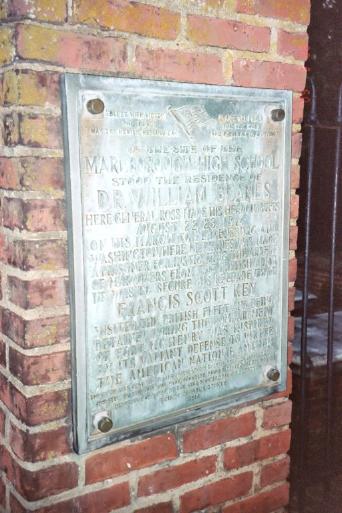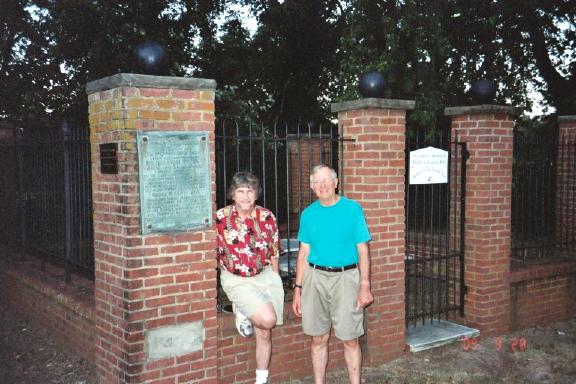Dr. William Beanes and the War of 1812
During the War of 1812, the governor of Maryland was worried the British would attack the capitol
and burn the state records, so he entrusted the records to Dr. William Beanes, in what was then
one of the main cities of Maryland, Upper Marlborough, in St. Georges County.
However, on an excursion by the British army, they pass by the town, and
Dr. Beanes has a few of the stragglers of the army (drunk by one account, perhaps looting)
arrested and thrown in jail. The British find out about this and aren't happy, so they come
back, free their soldiers and take the 65-year-old doctor away and throw him in their jail.
Apparently he was their only prisoner, even after the ransacking of Washington D.C. and Bladensburg
and other skirmishes in the area.

The townspeople contact some people to arrange for the freedom of Dr. Beanes,
(President Madison might be involved in the efforts), and Col. Skinner and
Francis Scott Key are called in for the negotiations. They pick up Dr. Beanes and are on their
way back to Fort McHenry, in Baltimore, when the British keep them from continuing because they
are currently attacking the Fort. As it says on the plaque by Dr. Beanes gravesite,
"On the site of the Marlborough High School stood the residence of Dr. William Beanes.
Here General Ross made his headquarters Auguste 22,23 1814 on his march to Bladensburg
and Washington. Here Dr. Beanes was made a prisoner for instigating the arrest of
marauders from the British Army. It was to secure his release that
Francis Scott Key visited the British Fleet and being detained during the bombardment of
Fort McHenry was inspired by its valiant defense to write the American National Anthem."
In September 2005, I visited my uncles Ken and Jerry in
the Baltimore area. They had recently come across this story in their research on the
Beans and found his rather unremarkable gravesite. This is back on a hill near a school in
Upper Marlborough. The plaques, and possibly the fencing, were erected in 1914, on the
centennial of the writing of the Star Spangled Banner. Despite this acknowledgement nearly
100 years ago, Dr. Beanes's role in the War of 1812 and the writing of National Anthem is
still rather obscure.
 But is he related?
But is he related?
From the viewpoint of the Bean family, the first thing you notice about Dr. William Beanes
is that his last name is spelled slightly differently than our modern name. We have not
shown he is directly related to our Bean ancestors, but there is a definite possibility of it.
Spelling was rather fluid during colonial times, and our ancestors were probably originally
MacBayne. The Mac was dropped fairly early, perhaps while in England (England and Scotland
had a series of wars during that time). Bayne is a Scottish word for "fair". Bayne was often
used, as well as Beane and Been, although most of the records in our family line use Bean.
Our earliest Bean ancestor came over in the early-to-mid
1600's to Valley Lee, St. Mary's County, Maryland. They were well-to-do and owned land
(probably plantations and slaves) in the
area east and then northeast of modern-day Washington, D.C.
Now in the 18th century, Dr William Beanes comes along, he lives in Upper Marlborough, Maryland,
to the northeast of Washington D.C. and is described as a "physician, planter and patriot".
There weren't that many established people living in this area with that type of name in the
late 1700's. I would not be surprised if it turns out he is a cousin of some kind to one of
our direct ancestors, but we know he is not a direct ancestor, and it is possible he is not
related at all. I've seen longer-lasting family stories that turned out to be false.
Research needs to be done, but I believe the records exist somewhere to prove or disprove
his relationship.
Back to the main family page.

 But is he related?
But is he related?